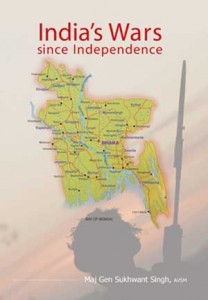“¦the sole representative of the Martial Law Administration, to carry on the fight. But Niazi had given up much earlier, as he told his captors two days ater.
On 14 December, the flow of panic signals between Dacca and Rawalpindi suddenly increased, clearly indicating the moral collapse of the authorities in Dacca. About 1000 hours a message read: “We have been living on hope… Please confirm something. Whatever has to happen should happen fast.” Obviously, this referred to the help from outside. Another message followed: “We have no missiles. What are we to fire? And no air force. Air raids are worrying us a lot.” A little later, another said: “Only Chittagong is left. All else is gone. It looks as though they will destroy Dacca. Everything is being destroyed. We are lost.” The most frutful information was: “At 1200 hours we are going to Government House.”
Inferring that a high-level meeting was in the offing, the Indian command ordered an air raid to disrupt the deliberations. The pilot who was chosen to undertake it had to be briefed in a hurry with a tourist guide map of Dacca obtained from a foreign airline. A rocket fell in the hall where the meeting was in progress, and this decided the issue. The Governor took cover in an air raid shelter nearby and borrowing a reporter’s ballpoint pen hurriedly wrote out his resignation. He thereafter dissociated himsef from Yahya Khan’s Government and sought refuge in the Hotel Intercontinental along with his cabinet under the Red Cross flag. Now it fell on Niazi, the sole representative of the Martial Law Administration, to carry on the fight. But Niazi had given up much earlier, as he told his captors two days ater. He had not slept for 12 nights and he just could not carry on any longer.
Tools:
- For the full text of Gen Manekshaw’s third message beamed to the Pakistani occupation forces in Bangladesh over All India Radio, see Asiaa Recorder, Vol XVIII, No 2 p 10563.
- The Soviet veto three times and the abstention of Britain and France prevented the passage of the US resolution till 14 December.
- The New York Times quoted official sources to report that the movement of US Navy ships (the nuclear-powered 7th Fleet) towards the Bay of Bengal was intended to provide “political support for Pakistan, whose army in Bangladesh was disorganised.”
- For a full account of the Government of East Pakistan’s resignation en masse, see Asian Recorder, Vol XVIII, No 2, p. 10563.
Eventually recognising realities, Yahya Khan addressed Niazi and the Governor the same afternoon with these words: “You have fought a heroic battle against overwhelming odds. The nation is proud of you and the world full of admiration. I have done all that is humanly possible to find an acceptable solution to the problem. You have now reached the stage where further resistance is no longer humanly passible, nor will it serve any useful purpose. It will only lead to further loss of life and destruction. You would now take necessary measures to stop the fighting and preserve the lives of armed forces personnel, all those from West Pakistan and all loyal elements. Meanwhile, I have moved the UN to urge India to stop hostilities in East Pakistan forthwith and to guarantee the safety of the forces and all other people who may be the likely target of miscreants.” This put the final seal on further resistance.
Click to buy: India’s Wars Since Independence
Niazi immediately approached the American Consul General in Dacca to arrange a ceasefire. The conditions he suggested were broadly four: regrouping the Pakistani armed forces by mutual agreement in designated areas; the safety of all those settled in East Pakistan since 1947; and a guarantee against reprisals for those who had helped the administration from March 1971. In the end, he gave an assurance that he would abide by whatever resolutions the UN passed. This message was transmitted by the Consul General to Delhi, and it was soon flashed all over the world. The Indians had however made known by then that they would accept nothing less than an unconditional surrender.





